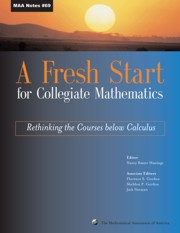Book contents
- Frontmatter
- Preface
- Contents
- Introduction
- Background
- Theme 1 New Visions for Introductory Collegiate Mathematics
- Theme 2 The Transition from High School to College
- Theme 3 The Needs of Other Disciplines
- Theme 4 Student Learning and Research
- Theme 5 Implementation
- Theme 6 Influencing the Mathematics Community
- Ideas and Projects that Work: Part 1
- Ideas and Projects that Work: Part 2
- 35 Mathematics in Action: Empowering Students with Introductory and Intermediate College Mathematics
- 36 Precalculus: Concepts in Context
- 37 Rethinking College Algebra
- 38 From The Bottom Up
- 39 The Functioning in the Real World Project
- 40 The Importance of a Story Line: Functions as Models of Change
- 41 Using a Guided-Inquiry Approach to Enhance Student Learning in Precalculus
- 42 Maricopa Mathematics
- 43 College Algebra/Quantitative Reasoning at the University of Massachusetts, Boston
- 44 Developmental Algebra: The First Mathematics Course for Many College Students
- 45 Workshop Precalculus: Functions, Data, and Models
- 46 Contemporary College Algebra
- 47 Precalculus: A Study of Functions and Their Applications,
- 48 Success and Failures of a Precalculus Reform Project
47 - Precalculus: A Study of Functions and Their Applications,
from Ideas and Projects that Work: Part 2
- Frontmatter
- Preface
- Contents
- Introduction
- Background
- Theme 1 New Visions for Introductory Collegiate Mathematics
- Theme 2 The Transition from High School to College
- Theme 3 The Needs of Other Disciplines
- Theme 4 Student Learning and Research
- Theme 5 Implementation
- Theme 6 Influencing the Mathematics Community
- Ideas and Projects that Work: Part 1
- Ideas and Projects that Work: Part 2
- 35 Mathematics in Action: Empowering Students with Introductory and Intermediate College Mathematics
- 36 Precalculus: Concepts in Context
- 37 Rethinking College Algebra
- 38 From The Bottom Up
- 39 The Functioning in the Real World Project
- 40 The Importance of a Story Line: Functions as Models of Change
- 41 Using a Guided-Inquiry Approach to Enhance Student Learning in Precalculus
- 42 Maricopa Mathematics
- 43 College Algebra/Quantitative Reasoning at the University of Massachusetts, Boston
- 44 Developmental Algebra: The First Mathematics Course for Many College Students
- 45 Workshop Precalculus: Functions, Data, and Models
- 46 Contemporary College Algebra
- 47 Precalculus: A Study of Functions and Their Applications,
- 48 Success and Failures of a Precalculus Reform Project
Summary
In response to the calculus reform movement in the mid-1990s, we wanted to find a way to prepare students for a calculus course that was more conceptual, contained more real-life applications, and required students to view functions in multiple representations. With the aid of an NSF grant (DUE-9354741) we set out to write projects that would have students solve interesting, real-life problems that involved multiple representations as well as multiple topics from a precalculus course. These 26 projects were eventually published under the title, Projects for Precalculus [1] and could be used as a supplement to any precalculus course.
We, along the with the publisher, thought it would be a good idea to write a textbook based on these projects. Using some of the same philiosophy from our projects, we set out to write Precalculus: A Study of Functions and Their Applications [2]. We wanted this to be a non-traditional precalculus text that treats functions as the object of study while focusing on important mathematical concepts. We did this by introducing each of the basic types of functions (linear, exponential, logarithmic, periodic, and power) early in the book rather than relegating each type to a separate chapter. Doing so allows us to emphasize the commonalities and differences between the various types of functions. The properties of each type of function are developed throughout the remainder of the text. This leads to a natural review as students build on their understanding of functions.
- Type
- Chapter
- Information
- A Fresh Start for Collegiate MathematicsRethinking the Courses below Calculus, pp. 386 - 389Publisher: Mathematical Association of AmericaPrint publication year: 2006

